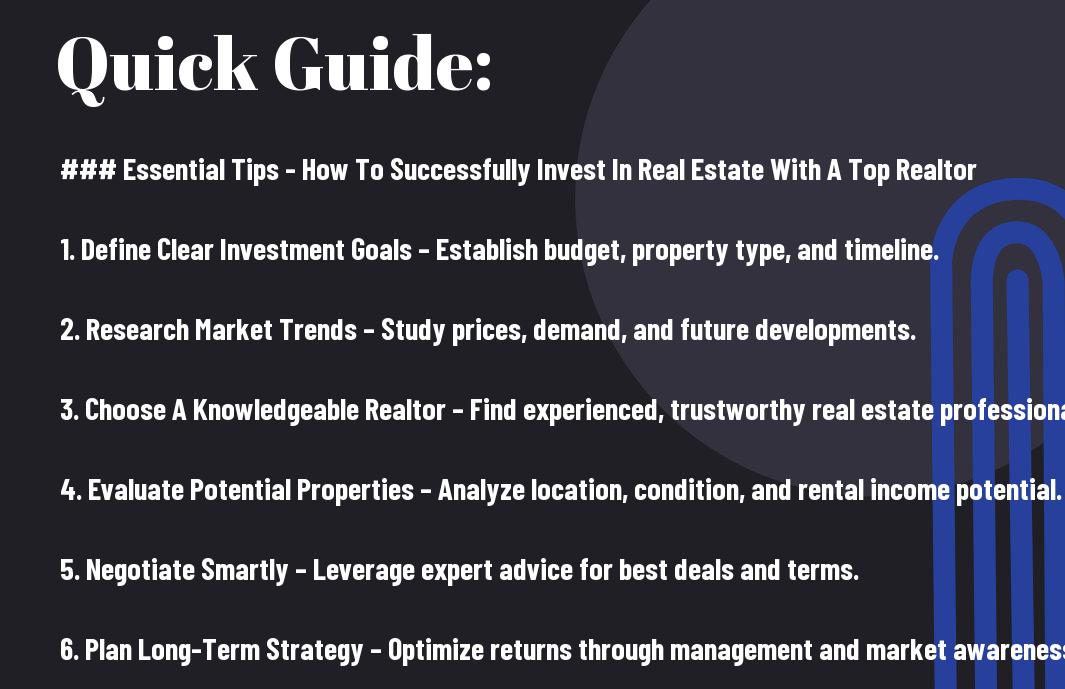Over the years, investing in real estate has proven to be a rewarding venture for many. To navigate this complex market effectively, partnering with a top realtor is imperative. In this guide, you’ll uncover valuable insights and practical tips to make informed decisions, maximize your investment returns, and build strong relationships with real estate professionals. By leveraging their expertise, you can streamline the process and ensure a successful investment experience.

Understanding Types of Real Estate Investments
The world of real estate investments is diverse and offers a variety of opportunities. As you consider your options, it’s imperative to understand the different types of properties available to invest in. Each type comes with its own set of benefits, risks, and requirements that may impact your investment strategy. Here’s a breakdown of the key types of real estate investments:
| Type of Real Estate | Description |
|---|---|
| Residential Properties | Single-family homes, apartments, and condos where individuals or families reside. |
| Commercial Properties | Properties used for business purposes, including office buildings and retail spaces. |
| Industrial Properties | Properties used for manufacturing, warehousing, and distribution of goods. |
| Land Investments | Vacant land or plots that can be developed or held for future appreciation. |
| Vacation Rentals | Properties rented out to tourists or vacationers for short-term stays. |
This overview gives you a foundation to start evaluating where you might want to focus your investment efforts. Understanding the distinctions between these property types is fundamental to developing a successful investment strategy.
Residential Properties
The investment in residential properties is often considered one of the most accessible entry points into the real estate market. These properties typically include single-family homes, multi-family units, and condominiums. Investing in residential real estate can provide you with steady cash flow through rent and the potential for property value appreciation over time. Moreover, the demand for housing remains relatively stable, which means that you are more likely to have continuous tenants.
When investing in residential properties, it’s imperative to conduct thorough market research to identify desirable locations. You should also consider the local rental market, property management options, and the regulations governing rental properties in your area. Proper due diligence will safeguard your investment and enhance your returns.
Commercial Properties
However, investing in commercial properties usually requires a more substantial upfront investment and a deeper understanding of the market dynamics. Factors such as location, tenant type, and economic conditions can dramatically influence the performance of commercial property investments.
Commercial real estate often involves a rigorous evaluation process that includes zoning laws, tenant leases, and property management. You’ll want to work closely with a skilled realtor to navigate this terrain effectively, ensuring that your investment meets both your financial goals and market conditions.
Vacation Rentals
An increasingly popular investment option is the vacation rental market, which allows you to capitalize on the demand for short-term lodging. These properties are commonly located in tourist hotspots and can provide significant returns, especially during peak travel seasons. You can choose to manage the rental yourself or use property management services to handle bookings and maintenance, giving you more flexibility in how you invest your time and resources.
The success of vacation rentals depends heavily on location, property appeal, and marketing. Understanding local regulations surrounding short-term rentals is also vital to ensure you comply with any specific requirements. Investing in vacation rentals offers the potential for robust cash flow and can be a fun way to engage with the real estate market.
Types of vacation rentals can vary enormously—from beach cottages and mountain cabins to city apartments, each offering unique advantages and challenges. As you explore this option, consider the investment and operational aspects thoroughly to maximize your income while minimizing your risks.
Essential Tips for Choosing the Right Realtor
Some factors can significantly influence your decision when selecting a realtor. It’s important to find someone who not only understands the local market but also aligns with your personal goals and preferences. Here are a few tips to keep in mind while searching for the right real estate professional:
- Look for experience in the local market.
- Check reviews and testimonials from past clients.
- Confirm their credentials and certifications.
- Explore their marketing strategies and approach to selling properties.
- Assess their availability and responsiveness.
Assume that the right realtor will be someone you can trust and who communicates effectively, ensuring a smooth and efficient home buying or selling experience.
Researching Realtor Credentials
For effective real estate transactions, you need to start by verifying your prospective realtor’s credentials. This includes checking their professional license, any additional certifications they may hold, and their track record in real estate transactions. Realtors often represent different specialties, such as residential, commercial, or investment properties, so it’s advantageous to choose one who has relevant experience matching your needs. Moreover, consider their involvement with professional organizations, as this often reflects commitment to ongoing education and networking within the industry.
Your due diligence in researching upfront can give you peace of mind that you’re choosing an informed partner. Do not hesitate to ask questions about their experience and successful past transactions; a qualified realtor will be eager to share their achievements and how they can help you meet your real estate goals.
Evaluating Communication Skills
On your journey to securing the right realtor, assessing their communication skills is paramount. A successful realtor should communicate effectively throughout the entire process, from initial meetings to closing the deal. Pay attention to how promptly they respond to your inquiries, how clearly they explain complex concepts, and how well they listen to your needs and concerns. A realtor with strong communication skills will keep you informed about market trends, offer guidance on pricing strategy, and provide timely updates on property listings.
Skills in communication can significantly impact your real estate experience. A realtor who excels in this area will foster an atmosphere of transparency and collaboration, which will pave the way for a successful transaction. You should feel comfortable expressing your thoughts and queries throughout the process, as your comfort directly affects your confidence in making important decisions regarding your investment. Aim to choose a realtor who makes you feel heard and valued, as this partnership is key to achieving your real estate goals.
Step-by-Step Guide to Investing in Real Estate
Unlike other investment avenues, real estate requires a strategic approach that can seem overwhelming at first. However, breaking down the process into manageable steps can make investing in property seamless and rewarding. To assist you in this journey, here’s a comprehensive step-by-step guide you can follow:
| Step | Description |
|---|---|
| Setting Your Investment Goals | Define what you want to achieve through real estate investments. |
| Conducting Market Research | Analyze market trends and potential investment locations. |
| Making Offers and Closing Deals | Learn the negotiation process and how to finalize transactions. |
Setting Your Investment Goals
Some of the first steps you should take involve setting clear and achievable investment goals. Are you looking for short-term gains or long-term rental income? Identifying your objectives will assist you in determining the type of properties you’ll be interested in and the nature of the investment strategy that fits your lifestyle. Furthermore, having solid goals will help in guiding conversations with your realtor, ensuring they align your interests with the available real estate opportunities.
Setting your investment goals not only establishes a roadmap for your real estate journey but also provides a framework to evaluate potential properties. By articulating specific metrics such as budget, desired return on investment, and acceptable risk levels, you will enhance your ability to make informed decisions throughout the buying process.
Conducting Market Research
Your success in real estate significantly hinges on well-executed market research. Begin by examining various neighborhoods and cities to understand local market trends. Look for indicators such as property values, rental rates, and the overall economic landscape that can impact your investment returns. You can also gather data from online resources or by engaging with your realtor, who can provide local insights and comparative analyses of property values.
A comprehensive approach to market research means not only focusing on current data but also considering future developments. Understanding the area’s growth potential, infrastructure developments, and local demographics will help you make an informed decision on where to invest. Additionally, visiting properties in person and connecting with local residents can provide invaluable information about the community and its potential for appreciation.
Making Offers and Closing Deals
Investment in real estate also involves the crucial aspect of making offers and closing deals effectively. When you find a property that meets your criteria, work closely with your realtor to craft a competitive offer based on your market research and investment goals. Knowing your maximum willingness to pay can help prevent emotional decision-making during this process, ensuring your offer remains appealing while being strategically advantageous.
Once your offer is accepted, the closing process begins. This includes conducting inspections, negotiating terms, and securing financing. Keeping meticulous records and working with reliable professionals, such as a title company or real estate attorney, will ensure a smooth transaction. Understanding all the paperwork and procedures involved will streamline the closing process and ultimately lead you to successfully owning your investment property.
Closing the deal marks a significant milestone in your investment journey. Ensuring that all inspections, contingencies, and finances are in order will lay the foundation for a successful property ownership experience. Taking the time to understand the details and workflow of closing also equips you with the knowledge to handle future transactions with confidence.
Key Factors to Consider Before Investing
All successful real estate investments stem from thorough planning and understanding. Before jumping into the market, you should evaluate several key factors to ensure that your investment aligns with your financial goals and risk tolerance. Consider the following:
- Your investment timeline
- The amount of capital you are willing to invest
- Your level of experience in real estate
- The economic indicators of the area you are targeting
- The type of properties that interest you
Assume that you take the time to analyze these variables carefully; it can lead to informed decisions that enhance your potential for profit while minimizing risk.
Location and Market Trends
Clearly, the location of your investment property plays a pivotal role in determining its long-term value. Researching market trends can provide insights into which neighborhoods are poised for growth. Look for areas with upcoming infrastructure projects, job growth, and demographic shifts that indicate a rising demand for housing. Additionally, consider the overall economic health of the region, competition among buyers, and local rental markets if you plan on renting the property. These elements can significantly influence your returns on investment.
Property Value and Financing Options
Assuming you have assessed the property’s current value accurately, you will want to explore the financing options available to you. Proper financing can not only facilitate your purchase but also help optimize your cash flow. Consider traditional mortgages, private lenders, or partnership arrangements that may fit your financial strategy best. Understanding the implications of each option can help you make informed choices that support your investment objectives.
Understanding how to evaluate property value involves analyzing comparable sales in the area, the tax assessment, and the potential for appreciation over time. Additionally, factors such as property condition, maintenance costs, and rental income potential can significantly impact your financial projection. A good realtor can provide you with comprehensive market analysis and assist you in navigating various financing alternatives to ensure that your investment aligns smoothly with your financial plans.
Pros and Cons of Investing in Real Estate
Despite its popularity, investing in real estate comes with both advantages and disadvantages that you need to consider. Understanding these can help you make informed decisions and guide you in working effectively with your top realtor.
| Pros | Cons |
|---|---|
| Potential for steady cash flow | High initial capital required |
| Property value appreciation | Market fluctuations affect value |
| Tax benefits and deductions | Ongoing maintenance and repairs |
| Leverage opportunities | Time-consuming management |
| Diverse investment opportunities | Risk of vacancy |
| Ability to create passive income | Legal and regulatory challenges |
| Inflation hedge | Emotional investment risks |
| Personal use options | Illiquidity of investment |
Advantages of Real Estate Investments
For investors like you, real estate can be a powerful asset class that provides numerous benefits. One of the key advantages is the potential for steady cash flow through rental income, which can offer you a reliable revenue stream over time. Moreover, property values often appreciate, meaning that your investment could increase in worth, leading to significant future gains when it’s time to sell. Additionally, there are various tax benefits available that can help you reduce your overall tax burden, allowing more of your earnings to stay in your pocket.
Furthermore, real estate offers the possibility of leveraging your investment. This means you can use borrowed capital to enhance your purchasing power, making it easier to acquire more valuable properties than you could with cash alone. This leverage can amplify your returns when your properties appreciate. With various options available, from residential units to commercial properties, you have the opportunity to diversify your investment portfolio, potentially mitigating risk while enhancing rewards.
Potential Risks and Challenges
Prospective investors should also weigh the potential risks and challenges associated with real estate investments carefully. While the possibility of appreciation and rental income is appealing, market fluctuations can significantly affect property values, and real estate isn’t always immune to downturns. The necessity of a substantial upfront investment can also be a barrier for some; furthermore, you’d need to account for ongoing maintenance and repairs, which can add unanticipated costs to your investment. Active management can be a time-consuming endeavor, particularly in striving to maintain occupancy rates and attract tenants.
Real estate investments can come with various other challenges, such as legal complexities, changing regulations, and the potential for emotional attachment to a property that might cloud your judgment. Additionally, investment properties may sit vacant for periods, impacting your cash flow while also requiring continuous financial commitments. By being aware of these risks and preparing accordingly, you’ll be better equipped to navigate the real estate landscape alongside your realtor.
Conclusion
On the whole, investing in real estate can be a rewarding venture, particularly when you partner with a top realtor who understands the market dynamics and your specific needs. By leveraging their expertise, you can gain insights into property values, emerging neighborhoods, and key investment strategies that can significantly enhance your portfolio. It’s necessary to communicate your goals clearly, as this allows your realtor to tailor their approach to your investment style, ensuring you make informed decisions that align with your financial objectives.
Additionally, don’t underestimate the importance of due diligence and research throughout your investment journey. A top realtor will not only help you identify lucrative opportunities, but they will also guide you through negotiations, inspections, and closings to ensure a smooth transaction. By educating yourself on market trends and maintaining open communication with your realtor, you can navigate the complexities of real estate investing with confidence and set yourself up for long-term success in the market.



